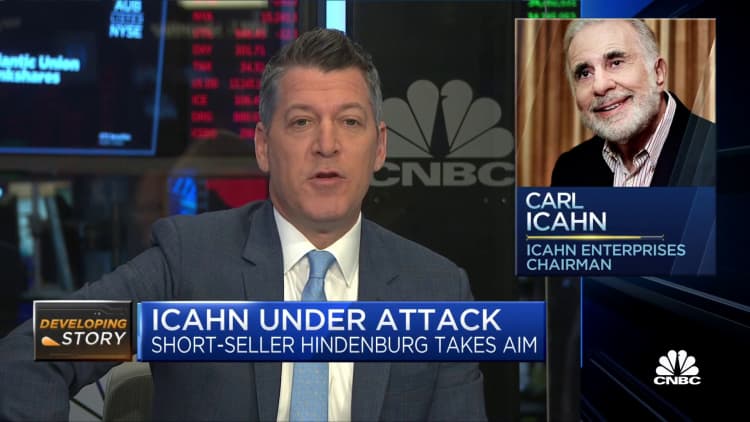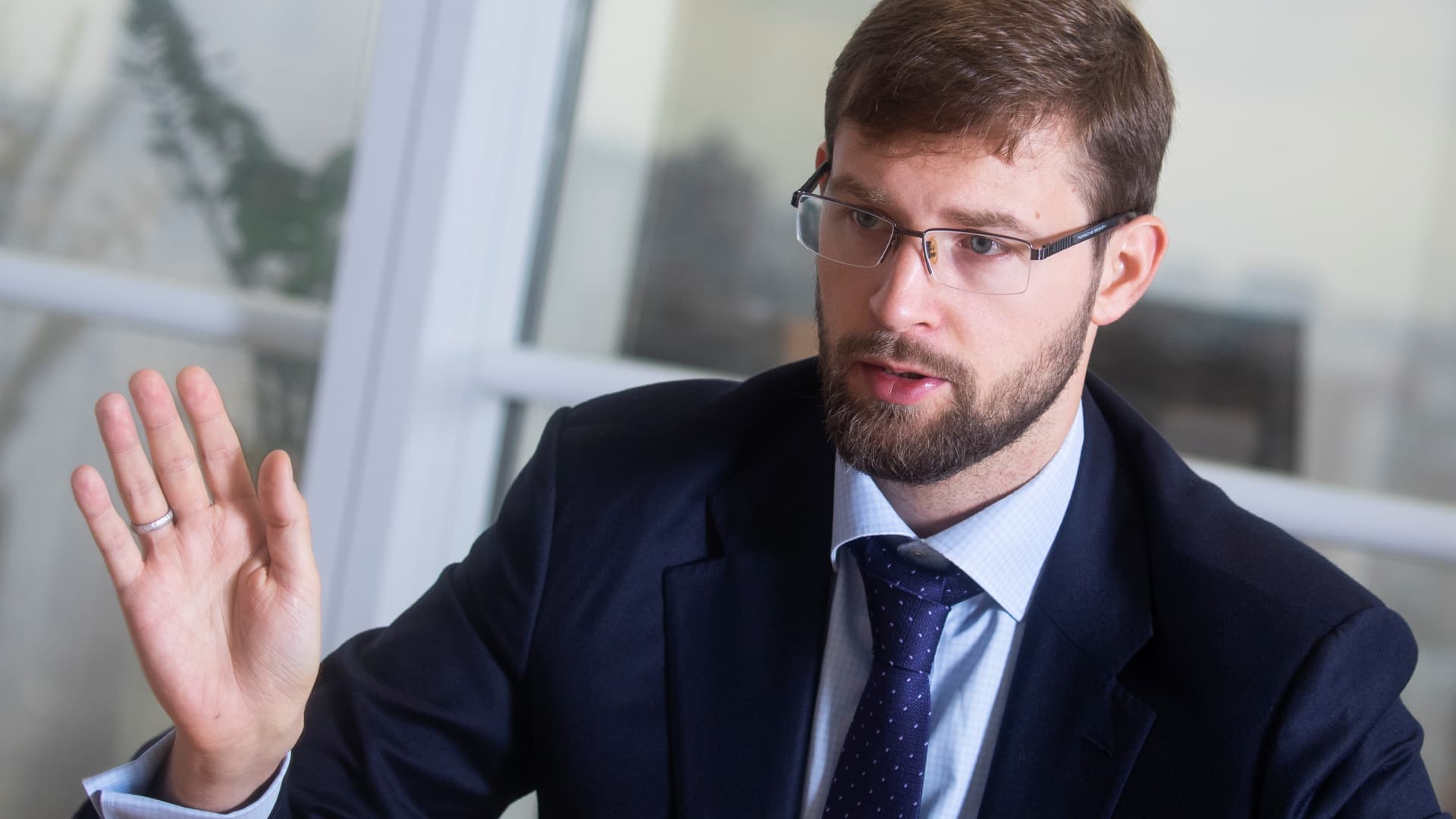Freedom Holding CEO Timur Turlov speaks during a press interview in Moscow, Russia, Oct. 10, 2019.
Maxim Shemetov | Reuters
Freedom Holding, a Nasdaq-traded Kazakh financial firm that’s been the target of prominent short sellers, is being investigated by federal prosecutors and Securities and Exchange Commission counsel over compliance issues, insider stock moves, and an offshore affiliate tied to sanctioned individuals, CNBC has learned.
The SEC’s Boston regional office has been probing Freedom for months, according to documents seen by CNBC and people familiar with the matter. The company, headquartered in Almaty, Kazakhstan, has a $5 billion market cap and is controlled and majority-owned by 35-year-old billionaire CEO Timur Turlov, a former Russian citizen.
The U.S. Attorney’s Office for Massachusetts is also making preliminary inquiries into Freedom, documents seen by CNBC show. Such inquiries often occur after a civil probe unearths evidence of possible crimes.
Freedom shares fell as much as 9.3% Friday morning after CNBC’s report.
The overlapping SEC and DOJ probes are scrutinizing the firm’s internal controls and offshore operations, as well as Turlov’s claims that Freedom can get its largely Russian client base access to hot U.S. IPOs, according to the documents and sources.
Turlov and Freedom are aware of the SEC probe, which has been going on for months, a person familiar with the matter told CNBC. The Justice Department’s involvement with these issues is more recent, documents show. Probes of this kind can take years and may not lead to criminal or civil charges. So far, there have been no formal charges or allegations of wrongdoing.
Turlov didn’t respond to CNBC’s interview request, but in an interview that was published by a Kazakh outlet Thursday, he acknowledged that “almost all global regulators came to us this summer.”
Freedom declined to comment.
An SEC spokesperson told CNBC that it doesn’t comment on the existence or nonexistence of an investigation.
A Justice Department spokesperson declined to comment.
The SEC has been aware of potential securities violations at Freedom since at least 2022. Some of the issues that caught investigators’ attention — including allegations related to sanctions violations, IPO access and stock trading — were also raised in an August report from short seller Hindenburg Research, which claimed that Freedom “still does business in the Russian market, and that the company has openly flouted sanctions along with anti-money laundering (AML) and know-your-customer (KYC) rules.”
The SEC intensified its scrutiny after the Hindenburg report and an analysis published in April by short seller Citron Research, sources familiar with the matter told CNBC.
Freedom’s website describes the company as a provider of investment banking and brokerage services to Central Asia and Eastern Europe. Its website lists two addresses in the U.S., one in New York and the other at a Las Vegas co-working and virtual office space.
The company leases a 15,250-square-foot office in the Trump Building in New York’s Financial District, according to filings. The two floors house Freedom’s existing U.S. operations, including a brokerage firm registered with the Financial Industry Regulatory Authority. Freedom says in filings it has nearly 3,700 employees and 370,000 brokerage customers.
The Trump Building at 40 Wall St. in New York.
Jin Lee | Bloomberg | Getty Images
Turlov founded Freedom in 2010, and by 2013 he had expanded the business from Moscow to the EU. The company said it divested its Russian business in February, almost a year after Russia launched its invasion of Ukraine. Turlov, a former citizen of Saint Kitts and Nevis in the Caribbean as well as Russia, owns 71% of Freedom shares, worth roughly $3.6 billion.
Turlov has been a citizen of Kazakhstan since 2022. He was required to renounce both his Saint Kitts and his Russian citizenship, as Kazakhstan doesn’t recognize dual citizenship.
‘Signs of illegal activity’
The Hindenburg report, in part, alleged that Freedom helped sanctioned individuals gain access to the U.S. financial system through a Belizean holding company, also owned by Turlov, that helped funnel and obfuscate transactions. In SEC filings, Freedom acknowledged it does business with sanctioned individuals through the Belize affiliate, but denies those individuals have access to U.S., U.K. or EU financial systems through Freedom.
The Belizean entity, incorporated in 2014, is now named Freedom Securities Trading Belize, or FST Belize.
“FST Belize, we have the same sanctions compliance as in the entire holding,” Turlov said in an August interview with a publication in Kazakhstan. “There is no reason for sanctions, if there is no involvement of U.S. representatives in the operation.”
FST Belize holds Kazakh licenses that let it operate a securities trading platform and process international payments and money transfers, according to the company. In 2021, the Kazakh government added the subsidiary to a list of companies “with signs of illegal activity.”
In response, Freedom said it “fully complies” with local laws and regulations wherever it operates.
Another point of inquiry by U.S. authorities is the trading activity of Freedom stock, which was uplisted to the Nasdaq in 2019 under the ticker FRHC after previously trading over the counter.
Historically, negative reports from established short sellers will hurt a company’s stock. Freedom shares dipped about 8% the two trading days that followed Hindenburg’s report. They quickly rebounded, including a 25% jump on Aug. 18, with no apparent explanation.
Hindenburg alleged that Freedom and Turlov protected the company’s stock from wild swings by ensuring that clients held the shares in their brokerage accounts, reducing the risk of volatility.
At least five law firms have said they’re investigating claims on behalf of investors for potential violations of securities law since the Hindenburg report.
Citron compared Freedom to Sam Bankman-Fried’s failed and allegedly fraudulent trading firm, Alameda Research. The investment firm said Turlov’s ties to Russia and its continued brokerage operations in the country made the company a prime candidate for an SEC investigation.
Freedom Holding’s main offices are in Esentai Tower, the tallest building in Kazakhstan’s financial hub, the city of Almaty. Other tenants in the Skidmore, Owings & Merrill-designed building include the Ritz-Carlton Almaty and Ernst & Young’s Kazakhstan operations.
Andrey Rudakov | Bloomberg | Getty Images
Freedom has faced prior regulatory challenges.
In July, the company’s European subsidiary paid a 50,000 euro fine to the Cypriot securities regulator over failures in its money laundering and anti-terrorist financing controls.
And last year, Freedom’s former U.S. auditor, WSRP, was replaced by Deloitte Kazakhstan, after the U.S. audit regulator found that three of Freedom’s auditors at WSRP failed to follow proper standards of review. Freedom’s auditors were sanctioned and barred for what the regulator said was a failure to assess the true nature of the company’s relationship with its Belize entity.
Those auditors are eligible to reapply for reinstatement. But WSRP stepped down as Freedom’s auditor. Deloitte Kazakhstan helped Freedom restate the prior auditor’s erroneous filings to the SEC and regain compliance with exchange rules, filings show.
Deloitte’s Kazakh office is just a few blocks away from Freedom’s headquarters, on the outskirts of Kazakhstan’s largest city and financial hub. Freedom is the only SEC-registered U.S. company that Deloitte Kazakhstan audits, according to Public Company Accounting Oversight Board records.
A view from Almaty’s Esentai Tower, where Freedom’s head offices are. The offices of Deloitte Kazakhstan, Freedom’s latest auditor, can be seen in the distance, near the building with a green illuminated sign.
Wwd | Penske Media | Getty Images
“First thing to consider is that the company has been audited by the largest big-4 auditor, Deloitte,” Turlov said, in his response to Hindenburg’s report.
Deloitte and Roman Sattarov, the Deloitte partner overseeing Freedom’s audit, didn’t respond to CNBC’s request for comment.
Freedom is still trying to expand in the U.S. In February, the company agreed to pay $400 million, primarily in stock, for middle-market investment bank Maxim Group. Maxim has worked on IPOs for many smaller companies and has been part of bigger deals, such as PIMCO Access Income Fund’s $866 million offering in 2022.
Turlov isn’t letting the U.S. probes keep him away. He traveled to New York last month.
“This week talking to our US office, partners and regulators,” he wrote in a Sept. 25 post on X, the social media platform formerly known as Twitter.
A spokesperson for Turlov said he was “definitely not meeting with regulators.”
In Turlov’s interview published Thursday in Kazakhstan, he didn’t say which U.S. regulators approached the company, but said it all stemmed from Hindenburg’s report, which he called “misinformation.”
WATCH: Hindenburg Research goes after Carl Icahn


